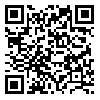BibTeX | RIS | EndNote | Medlars | ProCite | Reference Manager | RefWorks
Send citation to:
URL: http://rme.gums.ac.ir/article-1-43-en.html
Introduction: Recognition of faculty members' educational needs is the major factor to lead the educational system for determining goals and appropriate setting and organizing other important factors for promoting both faculties abilities and educational levels in universities. Scientifically, the first step for designing and educational planning is to determine individual educational needs that lead to optimize using of available sources. The goal of this study was to determine educational needs of Guilan University of medical sciences' faculty members in 2007.
Methods : This study was a cross-sectional descriptive in which 74 faculty members in Guilan university of medical sciences were involved. Sampling method was random by standard questionnaire from Michigan University. Reliability and validity was confirmed by experts. The results were analyzed by SPSS software.
Findings: Results indicated that faculty members' first preferences including as follow : % 38.1 writing standard lesson plans %77.6 using internet in education, %24.3 OSCE %73.6 acquaintance with e-learning, %21.4 EBM .It shows that %57.6 of faculties, (1-3 hr of) free time devoted to study and readiness for presenting in next session . %52.9 has less tendency to reform in education and %49.5 believe that students also show less tendency in this regard. %68.6 of faculties consider economical welfare as the most important motivational factor in individual promotion . The best time for presenting workshops (% 83.8) were start of courses in fall and on thursday also. Current facilities and educational atmosphere for applying new teaching methods were inappropriate from viewpoints of %56.7 and %58.1 respectively .
Conclusion: Faculty members believed that participating in workshop and educational courses had important role in promoting educational abilities and quality of education in university. Fields of educational course include teaching planning, methodologies, standard evaluation methods, educational technology and general skills. It is advised that EDC consider faculty members' educational needs in designing workshops and courses.
| Rights and permissions | |
 |
This work is licensed under a Creative Commons Attribution-NonCommercial 4.0 International License. |


